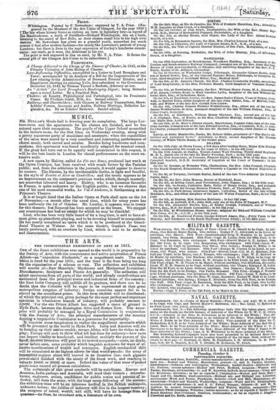MUSIC.
MILLAR'S Music-hall is drawing near its completion. The large Lec- ture-room and the, apartments for his classes are finished, and he has entered upon their occupation. The pupils of the Upper School assembled in the lecture-room, for the first time, on Wednesday evening, along with a peaty; ntimerous perky, of musicians and amateurs; when the capabilities of the salon were tested -by a very excellent and-interesting performance of choral muele,. both sacred and secular. Besides-:being handsome and com- modious, this apartment was found excellently adapted.for musical sound. It the great ball turn out to be equally well conittructed in this respect, it will.be the-best locale in London for choral per/ore:lances on the most ex- tensive wee. - + A new opera by Haldvy, called La Fee aux Roses, produced last week at the-Opdra Comique, hes been received with much; favour by the Parisian public; and, -from the criticisms in the journals, it would appear to deserve its success. ._Tbe..lihretteehy, the inexhaustible Scribe, is light and fanciful, in the style of Zemire et Azor or Cendrillon; and the music appears to, be an• improvement on the composer's previous works, which, though masterly, are somewhat laboured and heavy. Haldvy, who is an immense favourite in France, is rite unknown to the English public; but we observe that mittef his most successful wogks, 'Le Yol d'Andorre, is forthcoming at the Princess's Theatre. It is it length feted that the Italian Opera at Paris shall open on the 1st of -Novembere—a month after the usual time, which for many years has been uniformly the 1st of October. Mr. Lumley, it appears, was in treaty for-this theatre; but Ronconi has been accepted as the lessee. We snspept
our coutitryinan has had ariegtiar,6 for which he MaY -
Liszt, who has been very little heard of for a long time, is said to have al- most giien up pianoforte-playing, and to be devoting himself to composition. He has pearly completed an opera which is to be produced at the Grand- &Mal Theatre at Weimar. At the same theatre, Goethe's Tessa was lately performed, with an overture by Liszt, which is said to be striking and characteristic.


























 Previous page
Previous page